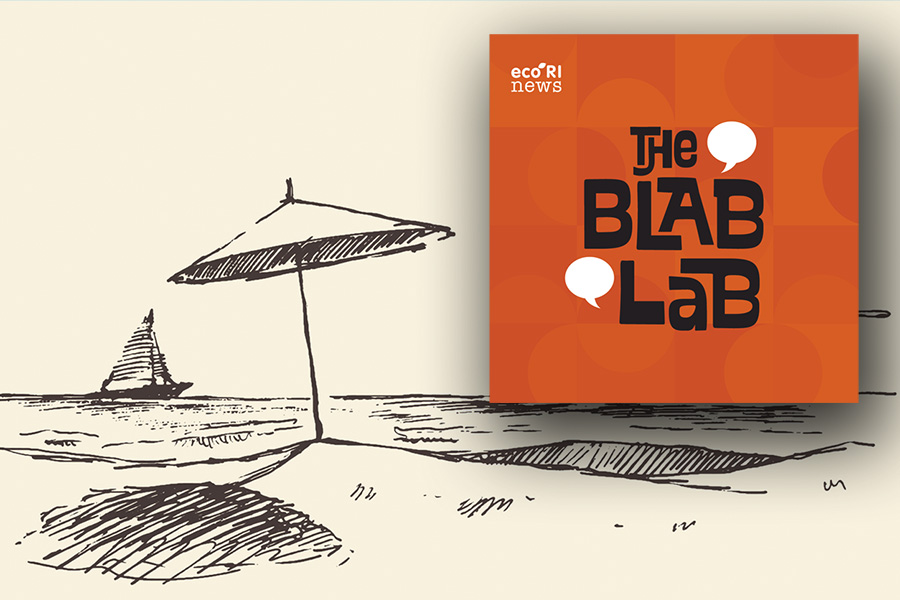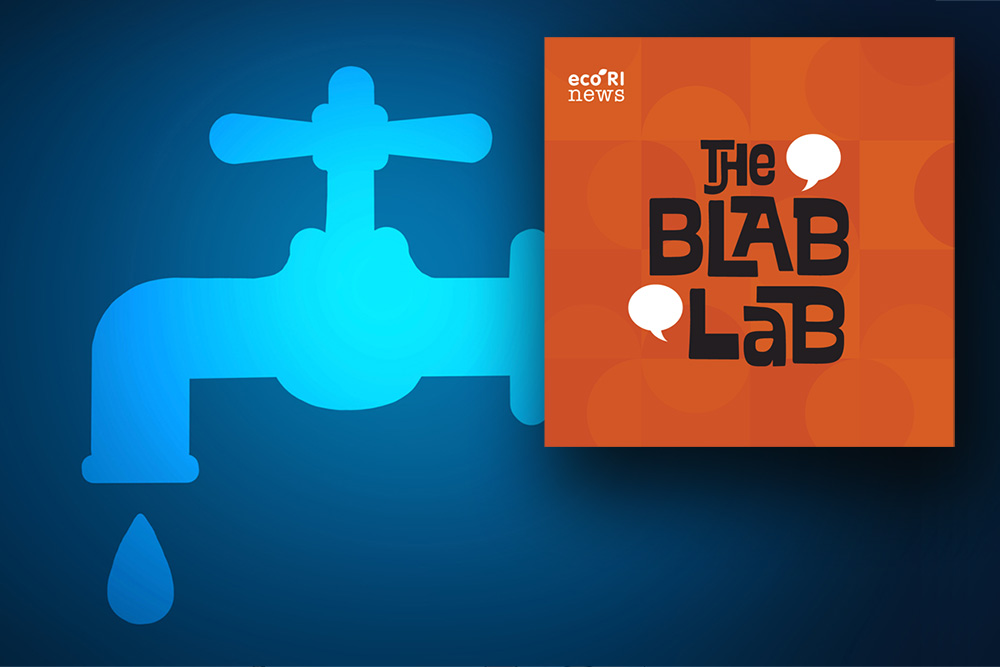Living Car-Free
September 28, 2023
Providence resident Greg Gerritt hasn’t driven a car in more than three decades. Reporter Colleen Cronin interviews Greg about hitchhiking to carpentry jobs, walking 8 to 10 miles a day, and how living car-free has made him happier, healthier, and more financially secure.
Subscribe and listen on iTunes, Spotify, or wherever you get your podcast.
This transcript was edited for clarity and length.
Colleen Cronin
Welcome to The Blab Lab, a twice-monthly podcast from the reporters of ecoRI News, where we unpack the critical environmental issues facing southern New England.
Today I’m here with lifelong environmentalist Greg Gerritt, whom you might already know a little bit about if you’re also a longtime reader ecoRI News — or if you’ve been following my Rhody Riders series, which has been profiling people who use transit. Thanks so much for coming on the show today, Greg.
Greg Gerritt
Well, thank you, Colleen, for inviting me.
Colleen Cronin
And before we get started talking more about your personal car journey, I was curious if you could talk a little bit about how we got to the studio.
Greg Gerritt
We took the bus today. We took the number 60 RIPTA bus. It is a fabulous route, because it goes from Providence to Newport. And it runs all the time, you know, all day all night. Well, as late as any of the other buses. I don’t ride the 60 very often. But it’s actually a very good ride. It’s kind of scenic in many places.
Colleen Cronin
It was really pretty. I have to admit, I usually drive to the podcast recording studio, which is at Roger Williams University in Bristol. And I didn’t realize how pretty a drive it is because I’m such a good driver, I’m focused on the road!
Greg Gerritt
Well, I’m glad you’re focused on the road when you drive. It is a pretty ride. I mean, you go into Barrington, Bristol, Warren. So, you go through some nice village centers. You see some nice woods, and you’ve got water views. So yeah, it’s a great ride, and for people who ride it a lot, they talk about the community on that bus line. Because it’s the only way to get from Newport to Providence without driving. So many people take full advantage of it.
Colleen Cronin
Greg, you don’t drive. Why?
Greg Gerritt
Interestingly, I grew up in New York City. My family didn’t have a car. That makes a huge difference, because you’re not used to being in a car all the time. And, if you wanted to go to the doctor, you walked, or you took the bus, or you took the subway. And even at eight years old, if I wanted to go someplace, I could get on the bus or the subway by myself and go someplace. So it never seemed like a car was necessary for freedom.
I did live in the suburbs for a few years. But it was a place where it was easy to get a bus, so that took care of that. And the rest of the places I walked.
I didn’t have a car when I went off to college. So, you know, trains and planes and buses, and I got around fine. Basically though, I’m a walker. New York City has a whole walking culture. And so it just seemed kind of normal for me. I did get a car when I went off to graduate school in Georgia. But I ended up leaving graduate school and just I got rid of my car when I did.
I gave it away. And I started hitchhiking all the time. When I was 22, I was hitchhiking everywhere. I hitchhiked all over the country. And then when I moved to Maine, I hitchhiked to all my jobs and hitchhiked and walked to work. I never got another car. I think maybe if I’d gotten a job at that age, I might have gotten a car. But I never really got a job. So, it didn’t really matter. I mean, I did have one job. I worked in a factory for a year and a half. And I hitchhiked to and from that. I just didn’t need a car. And after a while, I realized I was never going to need it.
I ran a carpentry business for 14 years, hitchhiking around to jobs with all my tools on my back. That worked well. I was never late. I mean, I was late once by five minutes. So, I could say in 14 years of hitchhiking to work, I was never late. After I’d given my car away in 1976 the car-free lifestyle worked for me — and I think I’m probably healthier and happier because I never had the money to own a car.
Colleen Cronin
You mentioned a lot of different things that you seem to love about not having a car. Can you talk also about the environmental benefits?
Greg Gerritt
I’ve always been a mass transit guy. So that was easy. But the fact is that an automobile is both expensive and, you know, environmentally destructive. I remember reading as a kid about endangered species. And it was like, OK, you know, you want to kill endangered species? The first thing you do is build a road. And so, I just felt like the automobile wasn’t really a good invention for the planet Earth. I figured that out a long time ago, about the same time the Exxon scientists figured out that climate change was going to kill us.
And so as I’ve evolved in my environmental career, it’s like, yeah, there’s just no point in having cars; they just don’t do the trick for keeping a healthy planet.
Colleen Cronin
You hitchhiked a lot in that period when you were living in Maine, you were in rural Maine?
Greg Gerritt
Yes.
Colleen Cronin
And what did the transportation scene look like there?
Greg Gerritt
When I first moved to western Maine, there was still a bus. But within a year, it was gone. This was the early ’80s. So, there was no longer any public transportation in the Farmington, Maine, area at all. There had been a bus that would go down to Lewiston. Farmington had a train station that was no longer in use for anything other than freight. But all those things were long gone. So essentially, Maine has a transportation system that — other than in Portland or Bangor — you drove.
In Maine because I hitchhiked to my jobs, I probably knew more people in the community than anybody else. Because they’d give me rides. And so, I got to check in with people every month just for five minutes to say hello. And that was important, but hitchhiking was easy, and it was legal, except on the interstate. Because the last time I hitchhiked on the interstate, I got a ride with a state trooper.
Colleen Cronin
And then you moved from Maine down to Providence, where public transportation is more common, but you decide maybe perhaps it’s an easier place to not have a car.
Greg Gerritt
My wife and I decided to move here, because she just didn’t really want to live deep in the woods anymore. And I said, if I’m going to not live in the woods, I have to live in a city. I can’t live in suburbia. And you know, part of that was not having a car. So, moving down here, it was like, I knew it was a place I could either walk or take a bus. From where we live, you could walk downtown in 45 minutes. That’s good. Because I need two or three hours a day of walking a day. It just never occurred to me to get back into driving. It just didn’t seem like it made any sense — financially or ecologically.
Plus, I wasn’t that good at driving.
Colleen Cronin
Perhaps our roads would be safer if more people realized their limitations, you know, and decided not to drive. Or maybe they’d probably be safer if mass transit was more common.
Greg Gerritt
In Rhode Island we don’t really have a good transit system. We have a system that works in a few places for a few people. If we had a mass transit system that worked, it would be a lot easier for people to not drive. But because we make it almost impossible for people to not drive, people don’t think about not driving.
Everybody thinks of themselves as a good driver. And having been a hitchhiker, I’ve ridden with some bad drivers. So, I know the difference between a good driver and a bad driver — and as a pedestrian, you have to study that carefully if you want to be safe. I’m almost 70, and I’ve managed never to get hit by a car.
I mean, Rhode Island drivers don’t know the law. They don’t know to stop at a crosswalk. They drive too fast. It’s just not a safe place to be a driver, and pedestrian.
Colleen Cronin
Talking about pedestrian safety specifically. I’ve seen a lot of people advocating for maybe slower speeds in the city. But are there other things that you think would make a difference?
Greg Gerritt
Yes, there are things that can be done —better education is, of course, critical. Actual enforcement would be nice. I mean, I know people who are, you know, middle-class burghers, solid citizens and on the PTA. And they hate it when they get a traffic ticket from one of those traffic cameras.
Colleen Cronin
I’ve written about what it’s like for older adults trying to get around on transit and how difficult that can be, specifically in Rhode Island. You told me you took the bus more before the pandemic? But you walk much more now. Why do you choose walking? And in what ways do you wish transit was a little bit better?
Greg Gerritt
Transit could be a lot better, and it should be better — with more frequent stops on more routes; they also should probably make it free. If they made it free, I think a lot more people would ride it. And that would help the entire transportation system and networks in Rhode Island just have more people on transit and fewer people in cars.
Colleen Cronin
Why walking for you?
Greg Gerritt
Most people think of me as a pretty high-energy person. So, I need to use a lot of physical energy over the course of the day. And then as a diabetic, I have to really manage my blood sugar. And walking for two-and-a-half, three hours a day really helps me manage my blood sugar. But also, it’s like, I need a lot of time to think. I have to have time to accumulate information and process it. And for me, processing time is walking time. And so having that time walking is critical for me.
Colleen Cronin
You also mentioned, when we talked before, that there’s a real community aspect to your walking, that you’ve gotten to know a lot of the people on some of your common routes,
Greg Gerritt
Yes. You know … North Main Street … there’s been 25 years’ worth of plans to revitalize North Main Street. All those plans sit on shelves; they’ve done almost none of it. So North Main Street has a lot of people that have no place else to go. You know, people always say cities are magnets for poor people. And that’s because poor people get kicked out of the small towns where there’s no public spaces, but cities have public spaces. So, there are lots of low-income people on the streets. And if you walk every day, and you say hi to people, the interaction eventually becomes a relationship, and you start talking about more things and different things. For me, it’s a really good way to keep in touch with what’s going on in the community. There are times I’m a lifeline for somebody who’s really having trouble. There are people that I know from being on the streets that I’ve gotten them to services. Those relationships are important. You get to know people you wouldn’t know; you get to see the parts of the city and people that you wouldn’t normally see. And I think that really helps me.
Colleen Cronin
I know that you will walk eight to 10 miles a day, which is wonderful. What are your favorite places to walk?
Greg Gerritt
The places I do the most walking are Swan Point Cemetery and the North Burial Ground. Those are both big places with lots of trees with wild animals and not a lot of people. Those two cemeteries are probably the second- and fourth-largest green spaces in the whole city. The North Burial Ground has just an amazing abundance of wildlife, if you know where to look and you’re willing to take the time to look.
Colleen Cronin
I’m curious if you’ve been able to convince anybody to stop using a car or maybe use a car less because of what you do.
Greg Gerritt
I can’t think of anybody who’s given up their car just because they met me.
Colleen Cronin
I was certain you would be able to convince someone else, so I’m surprised to hear that. But I wonder what your advice would be to someone who’s thinking about giving up their car, because there are probably people who are maybe a little bit car-free curious.
Greg Gerritt
I am sure there are people who would like to give up cars. I mean, part of it is the expense of owning a car is thousands of dollars a year, so, if you’re like me and don’t have thousands of dollars a year to put into a car, not having one is an easy choice. So, I’m sure there’s lots of people who would like not to have one but kind of feel constrained because their job is in a place that it’s hard to get to, or they’d have to change jobs, because they just couldn’t get to their job without a car.
There’s lots of things that we have in in the modern world that people never had 200,000 years ago, and they were not worse off because they didn’t have it …
Colleen Cronin
Thank you, Greg, so much for being on the show.
Greg Gerritt
Thank you so much for inviting me. It’s been a pleasure.
Colleen Cronin Thank you to our listeners for following along. We want to thank Vanessa Carlton for letting us use her song “Willow,” which you hear at the beginning and end of each episode. We also want to think Roger Williams University and professor Bernardo Motta for letting us use the recording studio. Thanks to Jo Detz for editing and mixing episode. If you have any questions, tips, or podcast ideas, email me at [email protected].
Categories
Join the Discussion
View CommentsRecent Comments
Leave a Reply
Your support keeps our reporters on the environmental beat.
Reader support is at the core of our nonprofit news model. Together, we can keep the environment in the headlines.
We use cookies to improve your experience and deliver personalized content. View Cookie Settings




yay Greg! I’ve known him a long time and still learned a lot about his life from this interview.
I reminded Greg that in the summer you can take the ferry from Providence to Newport. Almost a mini-vacation!